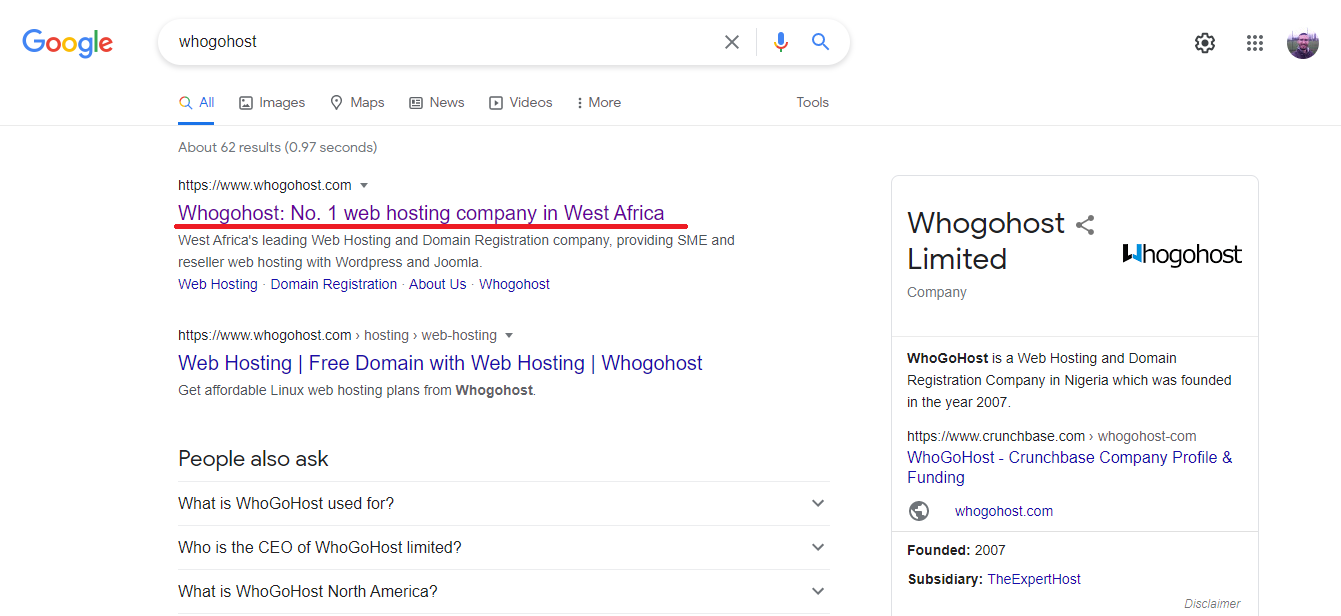
How To Rank Your Website On Google In Nigeria – Beginner-friendly Guide

If you run a business, blog, or online store in Nigeria, getting your website to rank higher on Google can be the difference between struggling for traffic and getting a steady stream of customers. Most Nigerians search Google first when looking for products, services, or information, which means showing up on the first page of Google Nigeria is critical.
In this guide, we’ll break down SEO in Nigeria into simple, actionable steps you can follow—even if you’re new to the world of search engine optimization. No tech jargon, just clear tips that work.
Why Google Ranking Matters in Nigeria
Most people turn to Google for everything from finding a caterer in Abuja to hiring a plumber in Lagos, and increasingly even for checking local event schedules or comparing product reviews. The higher your site appears in these search results, the more likely you are to get clicks, leads, and sales — and this visibility can directly translate to stronger brand awareness and customer trust.
Because Google tailors results to local searches, focusing on Nigerian-specific SEO can give you a big advantage, especially when you include locally relevant keywords, optimise your Google Business Profile, and earn mentions from trusted Nigerian websites. For a deeper dive into how search engines work behind the scenes, check out our beginner-friendly DNS guide, which explains how domain names connect users to your site.
Step 1 – Publish High-Quality, Relevant Content for Nigerians
Google rewards websites that give people the answers they’re looking for — and the more useful and relevant your answers are, the better. To do that effectively:
- Write about topics Nigerians are searching for by checking forums, social media trends, news headlines, and even popular YouTube comments to spot recurring questions.
- Use local examples, Nigerian currency (₦), and relatable scenarios — for example, instead of saying “grocery store,” say “shop in Yaba Market.”
- Publish a mix of blog posts, how-to guides, and FAQs that address real-life problems, such as how to renew a Nigerian passport online or compare the cost of internet providers.
- Add visuals like step-by-step screenshots, short explainer videos, or infographics — these make your content easier to follow and share.
- Keep your language simple and conversational so both beginners and intermediate readers can benefit.
You can make this process much easier with tools like the our Website Builder, which lets you quickly add, edit, and organise your content without hiring a web developer, meaning you can respond faster to trending topics and seasonal search spikes.
Step 2 – Use the Right Keywords (With a Nigerian Focus)
Finding Keywords Nigerians Search For
Use free tools like Google Keyword Planner or Ubersuggest to see exactly what Nigerians are typing into Google. These tools will show you how many people search for a term each month, how competitive it is, and even suggest related keywords you might not have thought of. For example, compare searches like “buy sneakers in Lagos” vs “buy sneakers online” — you may discover that location-specific terms attract more relevant visitors ready to purchase locally.
When researching, think about what your ideal customer would type when they’re ready to buy, not just when they’re browsing. Check Nigerian-specific search trends by setting the location filter to Nigeria in your keyword tool.
Why Long-Tail Keywords Work Well in Nigeria
Longer, more specific phrases (e.g., “affordable makeup artist in Lekki”) often have less competition and attract visitors with stronger buying intent. They’re also easier to rank for, especially if you’re just starting out. A bonus is that these keywords often reveal exactly what your audience wants — making it easier to create content that matches their needs.
Once you’ve found a strong keyword, secure a matching domain with our Domain Registration so customers can easily find and remember you. If your exact match isn’t available, try adding a local touch — like the city name — to keep it relevant and brandable.
Extra Tip: Combine your product or service with a location in your keywords for better local ranking. For example, instead of just “event planner”, try “event planner in Abuja” or “wedding event planner Lagos”. This small tweak can make a big difference in how quickly you show up for local searches.
Step 3 – Improve User Experience to Keep Visitors on Your Site
To reduce bounce rates and keep visitors engaged on your site:
- Make your site mobile-friendly so it works perfectly on any smartphone or tablet — test it on different screen sizes.
- Add clear, action-oriented CTAs like “Book Now,” “Get a Quote,” or “Shop the Collection” so users know exactly what to do next.
- Keep load times fast by optimising images, minimising plugins, and choosing reliable hosting — aim for under 3 seconds.
- Use short paragraphs, bullet points, and plenty of white space so your content feels easy to scan and read.
- Make navigation simple with a clear menu and search function.
Beginner Tip: Test your site on both slow 3G and fast 4G connections to understand the experience for users with varying internet speeds in Nigeria.
Practical Tip: Add FAQs on key pages to instantly answer common questions, address objections, and reduce the number of people leaving to find answers elsewhere.
Step 4 – Build Quality Backlinks (Locally Relevant)
Backlinks are like online votes of confidence. When respected websites link to yours, Google will see your site as more trustworthy and relevant.
- Partner with Nigerian bloggers or influencers in your industry and collaborate on content that benefits both sides.
- List your business in reputable local directories like VConnect or Nigerian Yellow Pages — these are easy wins for local SEO.
- Write guest posts for Nigerian news platforms, niche blogs, or community websites, sharing tips or industry insights.
- Offer valuable free resources, such as templates or downloadable guides, that others will want to link to naturally.
Practical Tip: Aim for backlinks that make sense for your audience. For example, if you sell catering services, a link from a Nigerian wedding planning blog will help more than a random international site.
Beginner Advice: Start with outreach to people you already know — suppliers, clients, or local business partners — and ask them to link to your site from theirs.
Pro Tip: Focus on earning 3–5 strong, relevant links a month rather than dozens of low-quality ones. Attend local industry events, webinars, and workshops to meet people who might link to you later.
Step 5 – Prioritize Site Speed
Slow sites lose visitors — people will click away if your site takes too long to load. Every second counts, especially with Nigeria’s varying internet speeds. Here’s how you can improve speed in practical ways:
- Use a reliable local host with servers close to your audience.
- Compress and resize images before uploading — tools like TinyPNG or Squoosh can help.
- Remove unused or outdated plugins and themes that may slow down your site.
- Regularly check speed with Google PageSpeed Insights or GTmetrix to see what needs fixing.
- Minify CSS, JavaScript, and HTML files to reduce unnecessary code.
Extra Advice: Enable caching so repeat visitors load your site faster, and use a CDN (Content Delivery Network) if your audience is spread across the country. This ensures people in Abuja, Lagos, or Port Harcourt all get quick load times.
Beginner Tip: Test your site speed on both desktop and mobile, and also on slower connections like 3G, to get a realistic view of how Nigerian users may experience it.
Step 6 – Optimize for Mobile
With over 85% of Nigerian internet users ,according to Staista, browsing primarily on mobile, your site absolutely has to look and function perfectly on small screens. If it doesn’t, you’ll lose visitors before they even see what you offer.
Here’s what to do:
- Ensure responsive design: Test your site on multiple devices — Android, iPhone, tablets — to confirm it automatically adjusts.
- Use readable text sizes: Avoid tiny fonts. Aim for at least 16px body text so people don’t need to zoom.
- Make buttons easy to tap: Keep buttons large enough for thumbs and spaced out so users don’t accidentally tap the wrong one.
- Keep key info visible without scrolling: Place your most important call-to-actions (like “Call Now” or “Order Online”) near the top of the page.
- Avoid pop-ups that block content: They can be frustrating on small screens and drive people away.
Practical Tip: Use Google’s free Mobile-Friendly Test tool to quickly see if your site passes the mobile experience check. If it fails, fix those issues immediately.
Extra Advice: Since many Nigerians browse with limited data, keep pages lightweight. Optimise images, reduce unnecessary scripts, and aim for fast load times on 3G connections.
Step 7 – Master On-Page SEO Basics
On-page SEO refers to everything you do directly on your website to help search engines understand your content and make it more appealing to readers. Think of it as housekeeping for your site — small tweaks that make a big difference.
Here’s what to focus on:
- Meta titles and descriptions: These are the snippets people see in Google results. Keep titles under 60 characters and descriptions under 160 characters. Include your keyword naturally and make them compelling enough for people to click.
- Headings (H1, H2, H3): Use one clear H1 (your main title), then organise the rest of your content with H2 and H3 subheadings. This makes it easier for both Google and readers to scan your page.
- Alt text for images: Always add descriptive alt text to your images. This not only helps visually impaired users but also gives Google more context about your page.
- Internal linking: Add links between your own pages and blog posts. For example, if you’re talking about domains, link to your domain registration page. This keeps users on your site longer and helps Google crawl your content better.
- URL structure: Keep your URLs short, clean, and descriptive. For instance, use yourbusiness.com/seo-tips-nigeria instead of yourbusiness.com/page?id=123.
- Keyword placement: Sprinkle your main keyword naturally in the title, first paragraph, headings, and a few times throughout the content — but avoid keyword stuffing.
Practical Tip: Before publishing any page, quickly run through a checklist: Does it have a proper title? A meta description? Clear headings? At least one internal link? This 5-minute check can dramatically improve your results.
Extra Advice: Install an SEO plugin like Yoast SEO (for WordPress) or RankMath. These tools guide you through on-page optimisations and ensure you don’t miss the basics.
Step 8 – Track Progress and Keep Improving
SEO is ongoing, so think of it like maintaining a healthy routine for your website rather than a one‑time task:
- Use Google Search Console and Google Analytics to see which pages are getting traffic, how users are finding you, and where improvements can be made.
- Check your keyword rankings monthly, but also pay attention to organic traffic and conversions, since rankings alone don’t always tell the full story.
- Refresh older blog posts and service pages with updated statistics, new examples, or clearer explanations to keep them relevant and engaging.
- Keep an eye on competitors — notice which topics they’re covering, how they structure content, and where they’re earning backlinks. Use these insights to inspire your own strategy without simply copying.
- Set small, achievable goals like increasing organic visits by 10% in three months, improving the bounce rate of your homepage, or getting two new backlinks a month. Tracking small wins makes SEO feel less overwhelming and shows your progress.
- Celebrate what’s working! If a blog post about “How to register a .ng domain” suddenly brings in traffic, double down by creating related content around domains and Nigerian hosting.
- Don’t be afraid to experiment — test new content formats like short explainer videos, polls, or infographics. Monitor performance, keep what works, and drop what doesn’t.
- Make SEO a habit: schedule a monthly check-in to review analytics, fix broken links, update plugins, and brainstorm new content ideas.
Beginner-Friendly Tip: Start simple — check once a month which 2–3 blog posts or pages are performing best and brainstorm how you can make them even more valuable for Nigerians.
Intermediate Tip: Track not just traffic, but also what actions visitors take. Are they filling out your contact form, subscribing to your newsletter, or buying a product? This shows you which SEO efforts are bringing real results.
Conclusion
Ranking on Google in Nigeria takes time and consistent effort, but these beginner-friendly steps will put you on the right track. Focus on creating great content, optimizing for local searches, and improving your site’s performance.
If you’re ready to take your website to the next level, explore our hosting, domains, and website tools to boost your SEO and get noticed online.



